- Colors: Black, gray, light blue, graphite, pebble, tan
- Material: Mesh back, foam seat
- Seat width: 25 inches
- Weight limit: 300 pounds
- Addons: Headrest
The Best Ergonomic Office Chairs for a More Comfortable Work Day
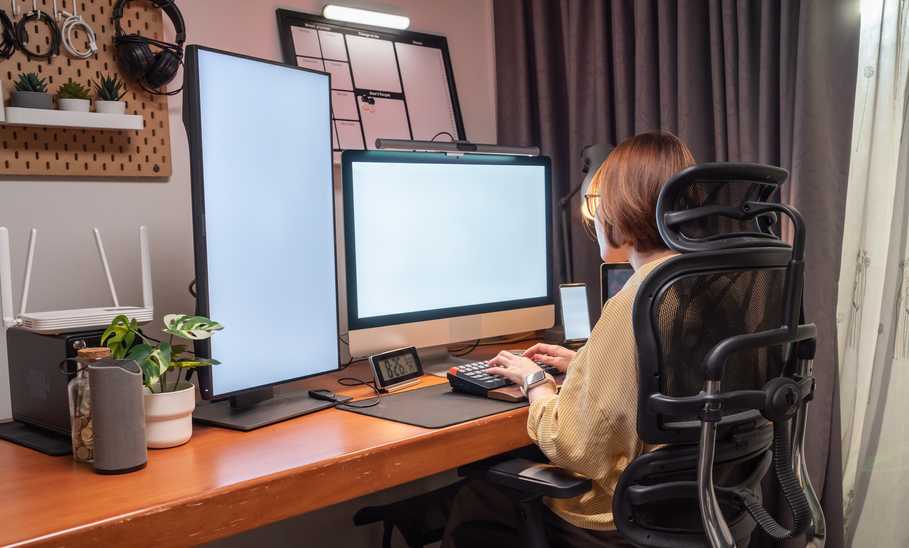
Our evaluations and opinions are not influenced by our advertising relationships, but we may earn a commission from our partners’ links. This content is created by TIME Stamped, under TIME’s direction and produced in accordance with TIME’s editorial guidelines and overseen by TIME’s editorial staff. Learn more about it.
If you have a job that requires long hours of sitting, you’ve probably experienced back and/or neck pain, ranging from slightly annoying to painful enough that you can no longer fully concentrate, no matter how coffee-fueled you may be. Waning concentration means it takes longer to get things done, which adds up to even more painful hours spent at our desks or workspaces—a vicious, back-wrenching cycle.
As well as not being able to work as efficiently, when we routinely put our bodies into unnatural positions, eventually our spines break down. Things that constitute “unnatural” in this instance include slouching, bad posture, and holding our bodies at an angle to perform a certain task (such as sewing or typing).
Investing in a good, ergonomic desk chair can help prevent and ease back and neck pain. Of course, since every body is unique, finding the perfect model for you can take some time and testing: What’s comfortable for one person will not necessarily be comfortable for another, so the best office chair is the one most suited for your specific body.
Certain ergonomic chairs, though, will make maintaining a healthy posture while working easier, no matter what your personal ailments and body type are. Below are our top picks for the best ergonomic office chairs, where you’ll find something to suit most situations and preferences.
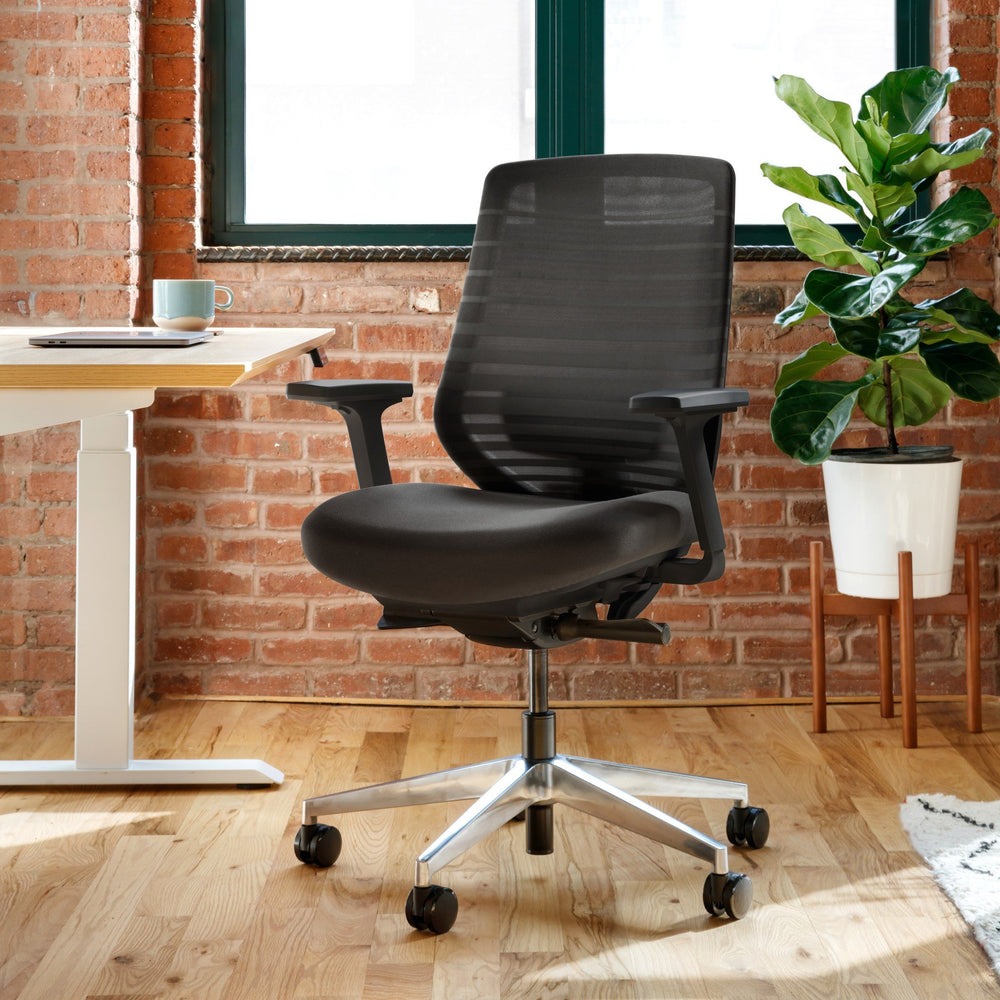
If you’re looking for an affordable ergonomic chair, this one from Branch has a full suite of adjustment points, including seat height and depth, armrest position, tilt, tilt tension, and lumbar support. The lumbar support can be moved forward or backward or completely removed. The seat is fashioned from a firm foam, while the back is made from contoured mesh that encourages an active posture, i.e., one where you’re not slumping in your chair (which leads to lower back pain). It's available in some cool color combinations, one of which will for sure match your stylish office decor.

For the price, this multifunction chair from Alera can’t be beat. The multifunction mechanism allows you to fully adjust the angle of the mesh back in relation to the seat, including moving the seat back and forth, changing the angle of the backrest and/or of the whole chair. The armrests move up and down as well as from side to side, giving you some control over the width. The biggest problem with this chair (well, honestly, with many of these kinds of chairs) is how difficult it is at first to remember what lever or knob does what. Save the instructions!

This VARI chair shows up in many offices, partially due to its mid-range price point and the fact that it's available at Office Depot/Office Max. The other big reason this is such a popular chair is that the seat is as cushioned and comfortable as they get. The height adjustment of the seat is excellent, too, as is the forward and backward capabilities of the seat.
Equipped with lumbar support that automatically adjusts to your body as you move, and featuring breathable, soft, flex mesh material, the X2 K-Sport Management chair is supportive, breathable, comfortable, and worth the higher price tag. As well as being ergonomic, the chair can be upgraded to include heating or cooling massage effects in the lumbar support region for an extra $100-150. Talk about a rejuvenating mid-afternoon break! We also love the other customizable options, such as castor color (including pink), armrests that swivel, and seat length.
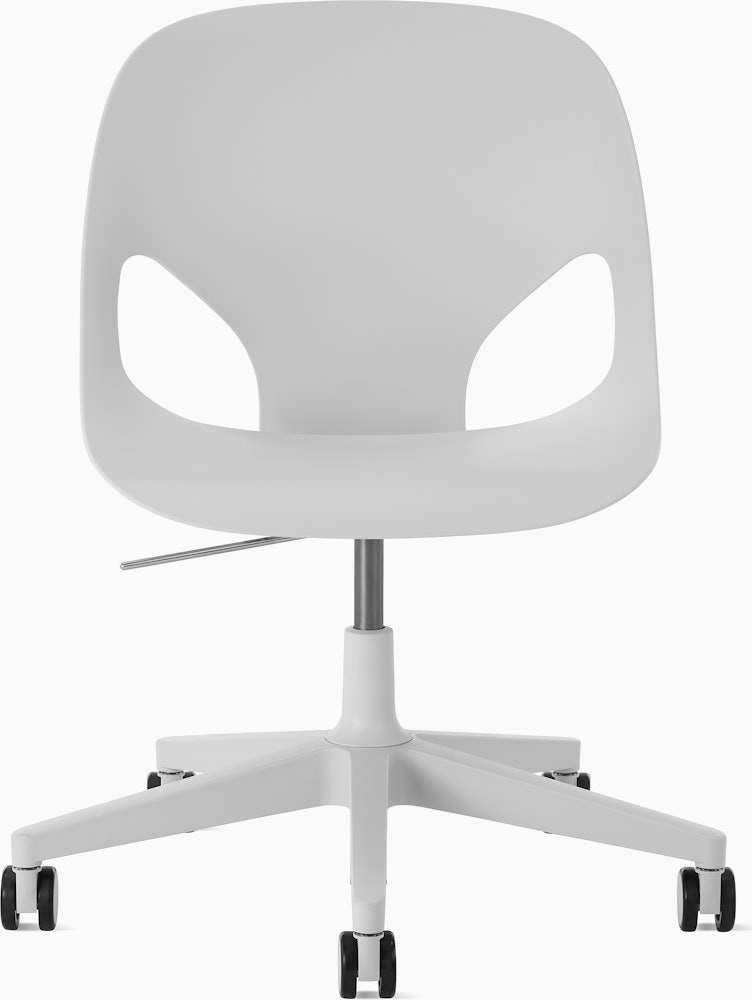
Available with or without a seat pad, the unibody Zeph Side Chair is designed for those who need lower back support. One of the most unique things about it is that it provides ergonomic support without any adjustments: The flexible shell shifts and responds to your movements. We especially love all the fun color options and the mid-century modern inspired design, as well as the size and moderate footprint (most office chairs take up a ton of space). This one is perfect for that home office tucked into the corner of a small apartment.
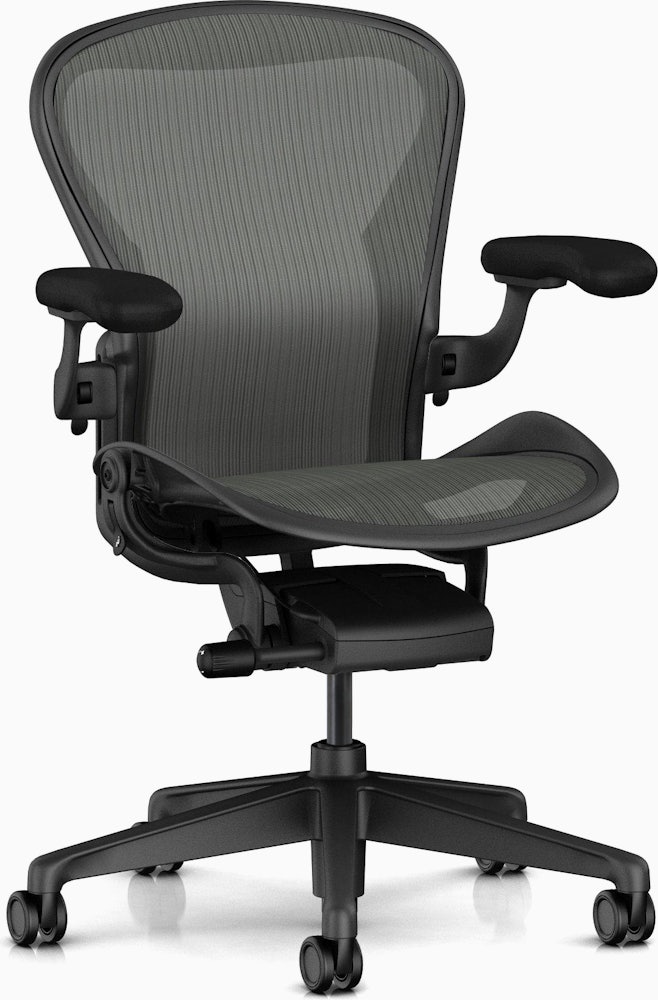
If you spend long hours at your desk (wherever your office may be), consider investing in the Herman Miller Aeron Chair. It’s definitely pricey, but many consider this chair the standard for all ergonomic office chairs, so if your budget allows, why not get the OG? One of the best things about this chair is the adjustable lumbar support that moves with you, as well as the mesh back and seat that provide full support while also ensuring you don’t experience the dreaded back (or butt) sweat. The arms can be set to a variety of heights, depths, and angles, while the harmonic tilt is engineered to ensure smooth and balanced reclining.
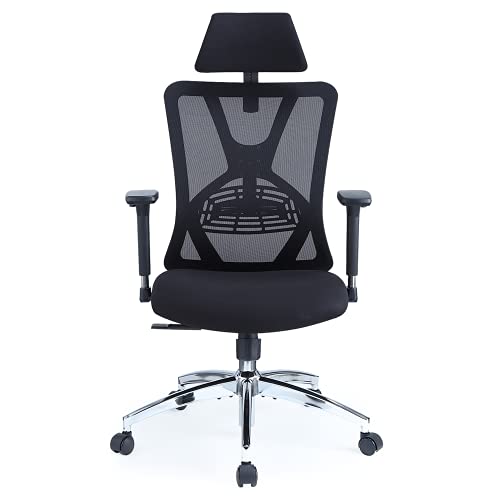
A headrest helps support your upper back and neck, as well as your head, and this chair has a fully adjustable, curved, foam one. As a cyclist, I often suffer from neck pain. When I add into that hours spent writing or sewing, that pain can reach pretty intense thresholds. The Ticova office chair provides some relief. I also like the thick foam seat and the exceptional lumbar support, plus the fact that this particular chair supports rocking—a repetitive motion I find beneficial to critical thinking. (You can lock out the rocking feature, if you don’t agree).
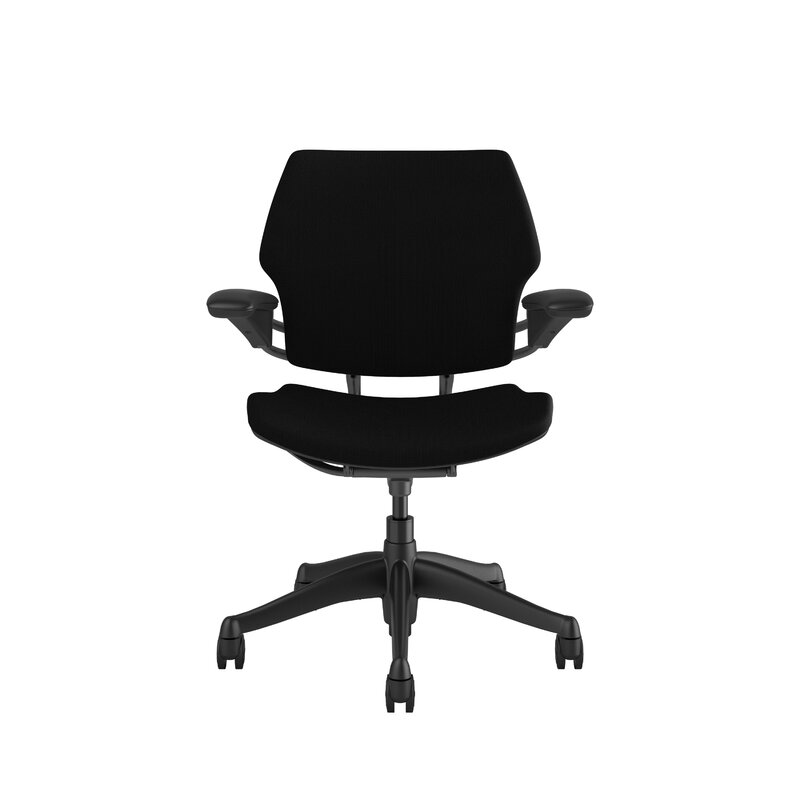
This chair is for those people who hate fiddling with knobs and levers, always having issues finding the exact position they want. You know the feeling: First you move the recline back, then it feels too far, so you move it forward again but then you feel as if you’re leaning precariously and no matter what, you can’t find the optimal position. Freedom has an “intelligent recline mechanism” that automatically adjusts to your movements – both slightly creepy and brilliant at the same time.
Intelligence comes with a higher price tag than many of the other chairs on our list but, if your budget allows, it’s worth considering..
/https://cdn.autonomous.ai/static/upload/images/product/galleries/20.50--1619514806524.jpg)
With a headrest and a breathable, flexible mesh back, the ErgoChair provides excellent support. One of the best things about this chair is the responsive lumbar support, which responds to the unique shape and curve of your body as you sit, easing pain and stiffness. It has 22 degrees of recline with five lockable positions, so you can be comfortable whether working, resting, or gaming. The green, blue, or red color options will add a vibrant burst of color to any workspace, especially if you’re someone who finds all the neutral tones of many offices rather drab.
/https://cdn.autonomous.ai/static/upload/images/product/galleries/22.60--1585044359632.jpg)
The ErgoStool helps to improve your posture by engaging your core as you sit. Stools also make going from sitting to standing easier and more fluid. When working at my cutting and patterning table, I use a stool because I don’t have to keep shuffling it around as I work, nor does it take up a lot of real estate when I do need to stand to reach something in a different area of the table (which is four feet wide and eight feet long). It has a weighted base which means if, like me, you like to be able to lean forward or backward without falling over, the ErgoStool has you covered. I also love that ErgoStool has a space age vibe and comes in at least one bright color option. The height is adjustable from 25 to 35 inches.
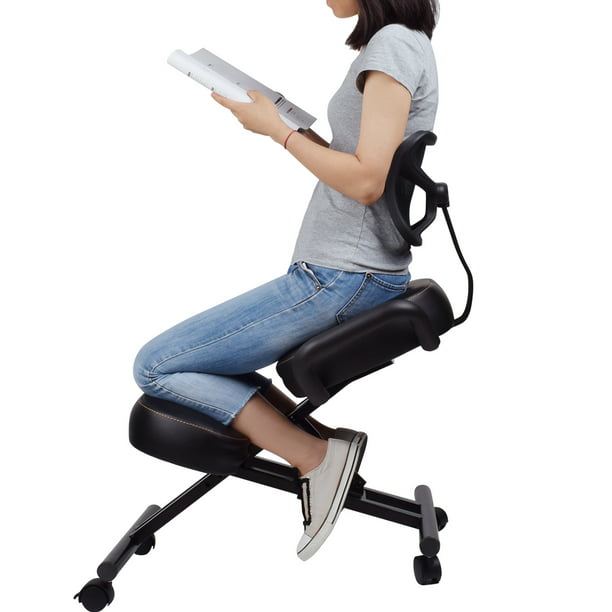
If you’re blessed with knees free from cartilage tears (unlike me), a kneeling chair provides an alternative working position that will take pressure off your glute and hamstring muscles, while lengthening your hip flexors and keeping your core engaged (both good things that will help alleviate back pain). Using a kneeling chair all the time is generally not recommended by doctors, as it does put pressure on your knees, but they provide a wonderful alternative to mix up your sitting position throughout the day.
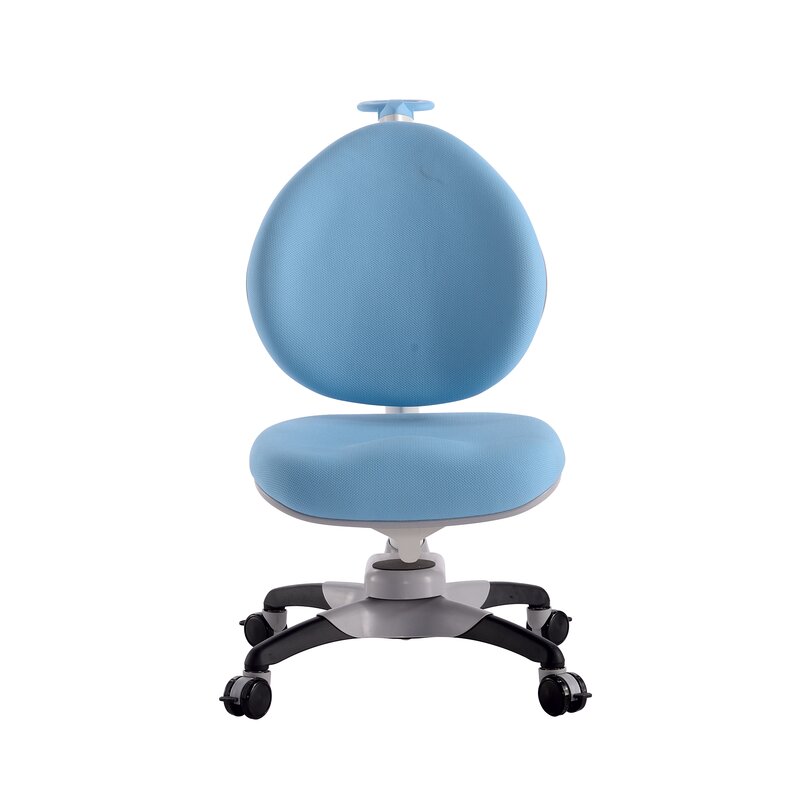
This affordable and simple chair is perfect for a child’s homework desk setup. Seat height (12 to 21 inches) and depth, as well as the backrest (21 to 32 inches) can all be adjusted with twist and lock knobs. The large range in height means this chair is capable of growing with your child. If your child is one of those who enjoys spinning and spinning in their chair there’s an anti-swivel lock–something many adult chairs might benefit from in some situations.

This PC gaming chair was designed to help maintain the spinal curves that are already present and can even help correct your teen’s bad posture over time. It has adjustable lumbar support, a headrest pillow, armrests, a seat with adjustable height and tilt, and a footrest; in fact, it may be a bit too comfortable, encouraging your teenager to spend even more time in front of their gaming set-up. This chair also has a full 155 degree recline which, with the footrest, means it makes an excellent sleeping chair as well. Don’t say we didn’t warn you.
Most of us probably don’t know exactly what a “neutral” body position is, only that we should try and maintain one. According to physical therapists, what you’re going for are feet flat on the floor, knees slightly higher than your hips, and your hips, shoulders and ears all aligned. (As I type this, I’m realizing that I’m currently failing on all counts as, for one, I have one leg tucked under the other.) Here are a few other things to consider when buying an ergonomic office chair:
The optimal, neutral position will be different for each person, which means that the first thing to consider when buying an ergonomic office chair is how adjustable it is. Ideally, a good office chair allows you to adjust the height, seat angle and position, and armrest height, as well as the angle of the backrest. Many also possess targeted lumbar support sections to ease lower back pain.
If your body temperature runs hot or someone in your office insists on keeping the thermostat set at a higher temperature, a chair with both the seat and back made from mesh will likely suit you best. Foam seats, on the other hand, although warmer, will provide more cushioning.
As well as journalism, I also work as a tailor and pattern maker for film and television. Every time I’m hired on a show, I work in a different shop or office, and every shop or office usually comes with a variety of ergonomic chairs that get handed down from production to production. At the beginning of a show or new season there is always the great chair shuffle, where everyone tries out multiple chairs to find the most comfortable one for them. Then they slap a label on it because if you don’t, someone will steal it. On some shows, the company even purchases new chairs. What this all means is that I’ve sat on an inordinately large number of chairs for an endless number of hours (10-12 hour days are the minimum in film and TV).
In addition to this personal experience, I also spent time researching product reviews and user forums to compile the best list possible of ergonomic chairs.
Ergonomic chairs are indeed better, as they encourage good posture and spinal alignment while providing support for your muscles that you won’t get in regular chairs. Ergonomic chairs form to your body, gently holding you in place.
If you sit at your desk for long hours, the UCLA Health Spine Center recommends making a few changes to the way you sit and the way your workspace is arranged. First, make sure you sit with your back against your chair and your feet flat on the floor. Then, make sure that the top of your monitor is level with your eyes and that your elbows can rest at a 90 degree angle when positioned on your workspace. Additionally, you should be able to slide your fingers under your thighs; if not, raise both your desk and your chair. Remember to take breaks and get up and move at least every four hours.
An ergonomic chair should fit so that the user can have their feet on the floor, with horizontal thighs and arms in line with the height of their workspace. The depth of the chair should be enough that you can sit with your back against the backrest while still having 2 to 4 inches from the inside of your bent knee to the chair seat.
The standard height of an ergonomic chair is between 16 and 21 inches. This range works well for most people.
An ergonomic office chair that adequately supports your body can help prevent aches and soreness. However, a chair isn’t a cure-all. You may need to get in the habit of better posture—one easy way is with the PosturePal iPhone app, which uses you the motion sensor in your headphones (AirPods 3, AirPods Pro, AirPods Max, or Beats Fit Pro) to determine if your head and neck are in the ideal positioning for good posture. You should also make sure you’re using a work backpack that evenly distributes weight, and perhaps consider a more supportive mattress (check out our list of the best mattresses for back pain).
The information presented here is created by TIME Stamped and overseen by TIME editorial staff. To learn more, see our About Us page.



